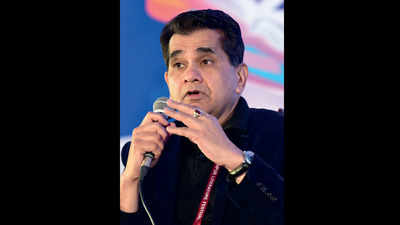- News
- City News
- jaipur News
- Jaipur Literature Festival: ‘Swachh Bharat Mission created behavioural change’
Trending
This story is from January 26, 2020
Jaipur Literature Festival: ‘Swachh Bharat Mission created behavioural change’
The Centre may have declared rural India open defecation free on October 2, 2019, but the claim was countered at the Jaipur Literature Festival forcing Amitabh Kant, CEO of NITI Aayog to say that Swachh Bharat Mission (SBM) was not an infrastructure project or construction of toilets alone, but creating a massive people’s movement for ushering in a behavioural change.

Amitabh Kant at a session
The Centre may have declared rural India open defecation free on October 2, 2019, but the claim was countered at the Jaipur Literature Festival forcing Amitabh Kant, CEO of NITI Aayog to say that Swachh Bharat Mission (SBM) was not an infrastructure project or construction of toilets alone, but creating a massive people’s movement for ushering in a behavioural change.
While giving a low-down of SBM captured in the book “The Swachh Bharat Revolution: Four Pillars of India's Behavioural Transformation” by Parameswaran Iyer, secretary at the Department of Drinking Water and Sanitation, the bureaucrat said that rural sanitation coverage was 38% when the programme started in 2014 but within five years, the campaign has achieved 100% target, changing the behaviour of 550 million people.
But fellow panelist Namita Waikar, managing editor and co-founder of the People’s Archive of Rural India, drew attention to the fact that data does not reflect the ground realities. “I challenge you to walk into any slum area in any city, marginal areas of any village or the railway tracks, you will find shit there. We are not defecation free,” said Waikar.
Referring to the garbage problems that urban areas face, Kant said that the challenge is that in the next five decades, India has to create two Americas in an innovative and sustainable manner.
“This is the first government which has talked about 100 smart cities. The challenge would be how do we do compact dense urbanization. The days of sprawling urbanization are over. America had sprawling urbanisation when it had land and water all available and its cities were made for cars. American car companies bought over railways and destroyed them so that cars could be sold. But today most of the successful urbanization is compactness and denseness, so that you are able to use public transportation and not use individual cars,” added Kant.
While giving a low-down of SBM captured in the book “The Swachh Bharat Revolution: Four Pillars of India's Behavioural Transformation” by Parameswaran Iyer, secretary at the Department of Drinking Water and Sanitation, the bureaucrat said that rural sanitation coverage was 38% when the programme started in 2014 but within five years, the campaign has achieved 100% target, changing the behaviour of 550 million people.
But fellow panelist Namita Waikar, managing editor and co-founder of the People’s Archive of Rural India, drew attention to the fact that data does not reflect the ground realities. “I challenge you to walk into any slum area in any city, marginal areas of any village or the railway tracks, you will find shit there. We are not defecation free,” said Waikar.
Referring to the garbage problems that urban areas face, Kant said that the challenge is that in the next five decades, India has to create two Americas in an innovative and sustainable manner.
“For India, lot of lessons come from eastern part of the world like Singapore where waste use is minimised at the household level. A great example of that is what Indore and Bhopal have done. They have managed to reduce household waste by about 40-45% just by segregating at the household level. They have converted waste into methane and methane into gas that is used for public transportation.”
“This is the first government which has talked about 100 smart cities. The challenge would be how do we do compact dense urbanization. The days of sprawling urbanization are over. America had sprawling urbanisation when it had land and water all available and its cities were made for cars. American car companies bought over railways and destroyed them so that cars could be sold. But today most of the successful urbanization is compactness and denseness, so that you are able to use public transportation and not use individual cars,” added Kant.
End of Article
FOLLOW US ON SOCIAL MEDIA










